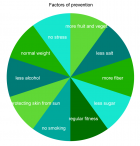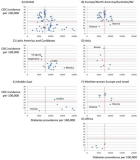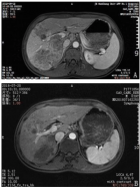Abstract
Case Report
May we feed cancer?
Maria Grazia Spurio*
Published: 12 February, 2018 | Volume 2 - Issue 1 | Pages: 001-006
The patient with an oncological disease presents a series of discomforts related to the psychological sphere such as depression, pain, sense of usefulness, anger, but also inconveniences related to food sphere. Neoplastic disease interferes with eating behaviour for several reasons. The communication of the diagnosis can create a state of anorexia as a result of the shock; certain tumours of the gastrointestinal tract-gold (mouth, esophagus, stomach, colon and rectum, but also pancreas and liver) are directly responsible for the possible alteration of food intake; alteration in eating behaviour may be secondary to the main therapeutic treatments. The link between food and cancer is not only evident in case of disease, but also in case of prevention, in fact a growing number of studies indicates more an more clearly the close correlation between a healthy diet and prevention of oncological diseases although at present time it is not still possible to give definitive results. The diagnosis of a person is like a melody in which some notes are repeated but their combination is almost infinite, because each person has different eating needs, as well as different psychological needs, and the starting point for a good professional must necessarily be a ‘customized’ diagnosis. This ‘diagnosis of well-being’, tailor-made for each person, involves professionals in both the food and psychological and behavioural sectors, since the individual needs have to be evaluated globally.
Finally, the professionals of human behaviour in food consumption, and the chemical and science processing experts, have the duty not to limit themselves to a single refusal against the use of certain foods, but framing the phenomenon in a wider perspective and, as experts of human health, to propose alternatives.
Read Full Article HTML DOI: 10.29328/journal.ida.1001005 Cite this Article Read Full Article PDF
Keywords:
Food; Cancer; Depression
References
- Spurio MG. ‘Words that Heal’. Psychiatria Danubina. 2015; 27: 21-27. Ref.: https://goo.gl/UA3XKN
- Spurio MG. “Milton Erickson e la Pet therapy”. Quale Psicologia. 2011; 38: 84-88. Ref.: https://goo.gl/HihBzF
- Zeig J. Erickson: Un’introduzione all’uomo e alla sua opera. Astrolabio-Ubaldini. 1990.
- Spurio MG. Il suono della guarigione. Roma. 2015.
- Stroebe M, Shut H. Family matters in bereavement; toward and integrative intra-interpersonal coping model. Psychological Science. 2015; 10: 873-879. Ref.: https://goo.gl/BcXvFe
- American Medical Network Inc. Retrieved on December. 2014.
- Timonen M, Laakso M, Jokelainen J, Ulla Rajala, V Benno Meyer-Rochow, et al. Insulin resistance and depression: cross sectional study. BMJ. 2005; 330: 17-18. Ref.: https://goo.gl/irPSoz
- Yerkes RM, Dodson JD. The relation of strength of stimulus to rapidity of habit-formation. J Comparative Neurology and Psychology. 1908; 18: 459-482. : https://goo.gl/pQeLT9
- American Institute for Cancer Research. Food, Nutrition, Physical Activity, and the Prevention of Cancer: a Global Perspective. 2007.
- Paget J. On a Form of Chronic Inflammation of Bones (Osteitis Deformans). Med Chir Trans. 1877; 60: 37-64. Ref.: https://goo.gl/Jw1Qvd
- Spurio MG. The new functional identity: a body that thinks, a mind that feels- frontiers and unexplored territories of the "body and mind zone". Psychiatria Danubina. 2016; 28: 111-115. Ref.: https://goo.gl/ezF3hK
Figures:

Figure 1
Similar Articles
-
Burnout and Related Factors in Caregivers of outpatients with SchizophreniaHatice Demirbas*,Erguvan Tugba Ozel Kizil. Burnout and Related Factors in Caregivers of outpatients with Schizophrenia. . 2017 doi: 10.29328/journal.hda.1001001; 1: 001-011
-
Multi-factorial Depressive Disorders Need Multi-dimensional InterventionsMustafa Melih Bilgi*. Multi-factorial Depressive Disorders Need Multi-dimensional Interventions. . 2017 doi: 10.29328/journal.hda.1001002; 1: 012-014
-
Anxiety and depression as an effect of birth order or being an only child: Results of an internet survey in Poland and GermanyJochen Hardt*,Lisa Weyer,Malgorzata Dragan,Wilfried Laubach. Anxiety and depression as an effect of birth order or being an only child: Results of an internet survey in Poland and Germany. . 2017 doi: 10.29328/journal.hda.1001003; 1: 015-022
-
May we feed cancer?Maria Grazia Spurio*. May we feed cancer?. . 2018 doi: 10.29328/journal.ida.1001005; 2: 001-006
-
Responding to Disasters: More than economic and infrastructure interventionsDavid Crompton OAM*,Ross Young,Jane Shakespeare-Finch,Beverley Raphael AM. Responding to Disasters: More than economic and infrastructure interventions. . 2018 doi: 10.29328/journal.ida.1001007; 2: 014-028
-
Mindset kinetics and some depression status: A new quantitative model under biochemical - toxicology approach?Luisetto M*,Ghulam Rasool Mashori,Behzad Nili-Ahmadabadi,Farhan Ahmad Khan,Kausar Rehman Khan. Mindset kinetics and some depression status: A new quantitative model under biochemical - toxicology approach?. . 2018 doi: 10.29328/journal.ida.1001008; 2: 029-039
-
Anti-anxiety effects in mice following acute administration of Ficus Thonningii (wild fig)Aduema W*,Akunneh-Wariso C,Ejiofo DC,Amah AK. Anti-anxiety effects in mice following acute administration of Ficus Thonningii (wild fig). . 2018 doi: 10.29328/journal.ida.1001009; 2: 040-047
-
Sleeplessness and healthSunitha V,Jeyastri Kurushev,Felicia Chitra,Manjubala Dash*. Sleeplessness and health. . 2019 doi: 10.29328/journal.ida.1001010; 3: 001-007
-
Translation, adaptation and validation of Depression, Anxiety and Stress Scale in UrduWaqar Husain*,Amir Gulzar. Translation, adaptation and validation of Depression, Anxiety and Stress Scale in Urdu. . 2020 doi: 10.29328/journal.ida.1001011; 4: 001-004
-
Depression as a civilization-deformed adaptation and defence mechanismBohdan Wasilewski*,Olha Yourtsenyuk,Eugene Egan. Depression as a civilization-deformed adaptation and defence mechanism. . 2020 doi: 10.29328/journal.ida.1001013; 4: 008-011
Recently Viewed
-
Unveiling Disparities in WHO Grade II Glioma Care among Physicians in Middle East and North African (MENA) Countries: A Multidisciplinary SurveyFatimah M Kaabi,Layth Mula-Hussain*,Shakir Al-Shakir,Sultan Alsaiari,Leonidas Chelis,Renda AlHabib,Sara Owaidah,Renad Subaie,Marwah M Abdulkader,Ibrahim Alotain. Unveiling Disparities in WHO Grade II Glioma Care among Physicians in Middle East and North African (MENA) Countries: A Multidisciplinary Survey. Arch Cancer Sci Ther. 2026: doi: 10.29328/journal.acst.1001048; 10: 001-005
-
Maximizing the Potential of Ketogenic Dieting as a Potent, Safe, Easy-to-Apply and Cost-Effective Anti-Cancer TherapySimeon Ikechukwu Egba*,Daniel Chigbo. Maximizing the Potential of Ketogenic Dieting as a Potent, Safe, Easy-to-Apply and Cost-Effective Anti-Cancer Therapy. Arch Cancer Sci Ther. 2025: doi: 10.29328/journal.acst.1001047; 9: 001-005
-
Analysis and Control of a Glucose-insulin Dynamic ModelLakshmi N Sridhar*. Analysis and Control of a Glucose-insulin Dynamic Model. Ann Clin Endocrinol Metabol. 2026: doi: 10.29328/journal.acem.1001033; 10: 010-016
-
Transumbilical Single-incision Hiatal Hernia Repair and Nissen Fundoplication in situs Inversus Totalis: A Rare Case ReportQing Cao,Chen Kang,Kang Gu,Yin Peng,Yang Lv,Xu-Zhong Ding,Peng Li*. Transumbilical Single-incision Hiatal Hernia Repair and Nissen Fundoplication in situs Inversus Totalis: A Rare Case Report. Adv Treat ENT Disord. 2026: doi: 10.29328/journal.ated.1001017; 10: 001-003
-
NAD⁺ Biology in Ageing and Chronic Disease: Mechanisms and Evidence across Skin, Fertility, Osteoarthritis, Hearing and Vision Loss, Gut Health, Cardiovascular–Hepatic Metabolism, Neurological Disorders, and MuscleRizwan Uppal,Umar Saeed*,Muhammad Rehan Uppal. NAD⁺ Biology in Ageing and Chronic Disease: Mechanisms and Evidence across Skin, Fertility, Osteoarthritis, Hearing and Vision Loss, Gut Health, Cardiovascular–Hepatic Metabolism, Neurological Disorders, and Muscle. Ann Clin Endocrinol Metabol. 2026: doi: 10.29328/journal.acem.1001032; 10: 001-009
Most Viewed
-
Impact of Latex Sensitization on Asthma and Rhinitis Progression: A Study at Abidjan-Cocody University Hospital - Côte d’Ivoire (Progression of Asthma and Rhinitis related to Latex Sensitization)Dasse Sery Romuald*, KL Siransy, N Koffi, RO Yeboah, EK Nguessan, HA Adou, VP Goran-Kouacou, AU Assi, JY Seri, S Moussa, D Oura, CL Memel, H Koya, E Atoukoula. Impact of Latex Sensitization on Asthma and Rhinitis Progression: A Study at Abidjan-Cocody University Hospital - Côte d’Ivoire (Progression of Asthma and Rhinitis related to Latex Sensitization). Arch Asthma Allergy Immunol. 2024 doi: 10.29328/journal.aaai.1001035; 8: 007-012
-
Causal Link between Human Blood Metabolites and Asthma: An Investigation Using Mendelian RandomizationYong-Qing Zhu, Xiao-Yan Meng, Jing-Hua Yang*. Causal Link between Human Blood Metabolites and Asthma: An Investigation Using Mendelian Randomization. Arch Asthma Allergy Immunol. 2023 doi: 10.29328/journal.aaai.1001032; 7: 012-022
-
An algorithm to safely manage oral food challenge in an office-based setting for children with multiple food allergiesNathalie Cottel,Aïcha Dieme,Véronique Orcel,Yannick Chantran,Mélisande Bourgoin-Heck,Jocelyne Just. An algorithm to safely manage oral food challenge in an office-based setting for children with multiple food allergies. Arch Asthma Allergy Immunol. 2021 doi: 10.29328/journal.aaai.1001027; 5: 030-037
-
Snow white: an allergic girl?Oreste Vittore Brenna*. Snow white: an allergic girl?. Arch Asthma Allergy Immunol. 2022 doi: 10.29328/journal.aaai.1001029; 6: 001-002
-
Cytokine intoxication as a model of cell apoptosis and predict of schizophrenia - like affective disordersElena Viktorovna Drozdova*. Cytokine intoxication as a model of cell apoptosis and predict of schizophrenia - like affective disorders. Arch Asthma Allergy Immunol. 2021 doi: 10.29328/journal.aaai.1001028; 5: 038-040

If you are already a member of our network and need to keep track of any developments regarding a question you have already submitted, click "take me to my Query."

















































































































































